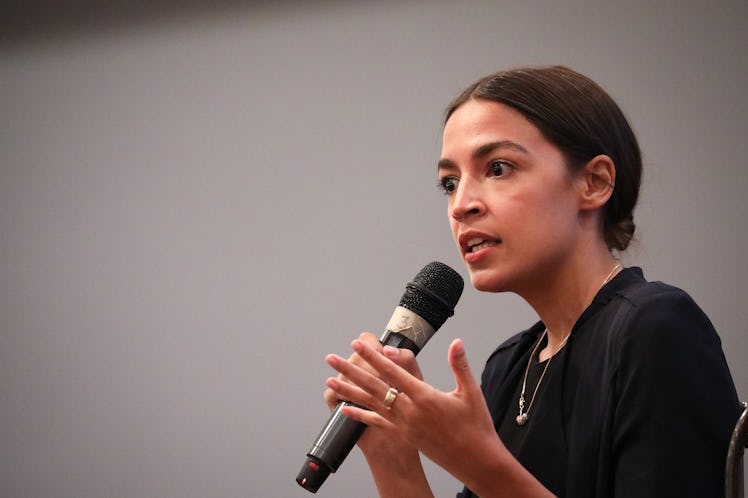
Alexandria Ocasio-Cortez Straight-Out Called Trump A Racist On '60 Minutes'
At this point, it's pretty clear that the new faces of Congress aren't holding anything back. The new wave of political leaders are ready to take Capitol Hill by storm and make change happen by any means necessary. Well, on Sunday, Jan. 6, freshman Rep. Alexandria Ocasio-Cortez called Donald Trump a racist, "no question," while appearing on 60 Minutes. Elite Daily reached out to the White House for comment about Ocasio-Cortez's statement, but did not hear back in time for publication. Talk about a start to the new year.
On Jan. 6, host Anderson Cooper sat down with newly sworn-in Democratic Congresswoman Alexandria Ocasio-Cortez of New York to talk about today's tense political climate. During the interview, Cooper asked Ocasio-Cortez whether she believes President Donald Trump is a racist, to which she confirmed he was with no hesitation in her voice.
"Yeah. Yeah. No question," Ocasio-Cortez replied.
Cooper asked her to explain why she believes that, to which the congresswoman cited Trump's rhetoric. She said,
When you look at the words that he uses, which are historic dog whistles of white supremacy. When you look at how he reacted to the Charlottesville incident, where neo-Nazis murdered a woman, versus how he manufactures crises like immigrants seeking legal refuge on our borders, it's night and day.
Elite Daily reached out to the White House for comment about Ocasio-Cortez's statement, but did not hear back in time for publication.
Following Ocasio-Cortez's remarks on 60 Minutes, White House Deputy Press Secretary Raj Shah released a statement to the program condemning Ocasio-Cortez's words. He said,
Congresswoman Ocasio-Cortez's sheer ignorance on the matter can't cover the fact that President Trump supported and passed historic criminal justice reform... and ... has repeatedly condemned racism and bigotry in all forms.
Ocasio-Cortez's comment about Trump might be bold, but she isn't the first one to call President Trump's controversial rhetoric problematic. For example, as the congresswoman mentioned, Trump's comments on the Charlottesville attacks sparked outrage among the public. On Aug. 12, 2017 a group of alt-right protesters gathered together in Charlottesville, Virginia to protest the removal of the Confederate Robert E. Lee statue in Emancipation Park. Later during the rally, fights between protestors and counter-protestors escalated and developed into violent riots, which ended up with a man driving a car into a crowd of counter-protesters, killing 32-year old Heather Heyer. The man was convicted of first-degree murder on Dec. 7, 2018 and faces a possible life sentence in prison.
Following the violence, Trump condemned the bigotry and violence exhibited at the protests, but proceeded to blame "both sides." His response was called out immediately on social media. Elite Daily reached out to the White House for comment on Trump's remark, but did not hear back.
In addition, Trump has consistently been criticized for his comments towards migrant communities. On Nov. 1, 2018, Trump delivered a speech addressing immigration, particularly asylum-seekers traveling to the United States' southern border. During the speech, Trump spoke out about migrant communities throwing rocks at U.S. troops at the border, to which he stated troops could open fire at those communities if that occurred. "They want to throw rocks at our military, our military fights back," Trump said. "I told them, consider it a rifle." Elite Daily reached out to the White House for comment about Trump's statement at the time, but did not hear back.
Since moving to the White House, Trump's rhetoric has been blamed for allegedly inciting a number of racially-driven acts of violence, with a study by the nonpartisan Public Religion Research Institute in October 2018 finding that 54 percent of Americans believed that the president's words and actions had encouraged white supremacy groups. It's not helped by the fact that the FBI found that in 2017 there had been a 17 percent increase in hate crimes from the previous year — the third year in a row that hate crimes had been on the rise. The White House did not respond to questions at the time regarding whether the president's rhetoric had contributed to the rise.
Let's hope 2019 proves to be a year that rejects racism and welcomes inclusion. One can only hope.